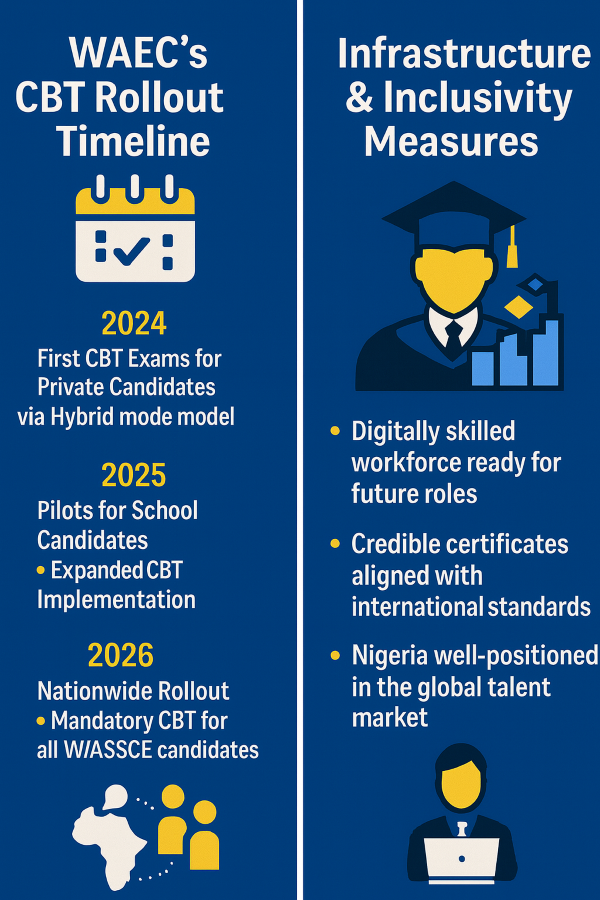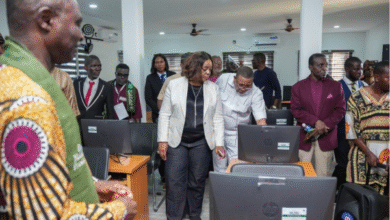WAEC Fast-Tracks CBT for WASSCE: Nigeria’s Education Enters Digital Testing Era

Nigeria’s education sector is on the cusp of a historic transformation as the West African Examinations Council (WAEC) reaffirms its readiness to fully migrate the West African Senior School Certificate Examination (WASSCE) to Computer-Based Testing (CBT) by 2026.
This digital shift, championed by WAEC and backed by the Federal Government and National Assembly, signals a decisive move to align Nigeria’s assessment standards with global best practices while safeguarding the credibility of its certificates.
From Pilot to Nationwide Rollout
Dr. Amos Dangut, Head of National Office, WAEC, explained that the transition is already underway following successful hybrid pilots for private candidates in 2024 and a full-scale deployment for school candidates in 2025.
“We are up to the task. There is no going back. By 2026, CBT will be deployed on a massive scale—just like JAMB. Mock sessions and online practice platforms will prepare candidates before the main examinations,” Dangut said.
So far, five CBT-based exams (four private, one school-level) have been conducted with smooth operations and, notably, empirically better performance outcomes than paper-based exams.

Infrastructure & Inclusivity: “No Child Left Behind”
A recurring concern is whether Nigeria’s infrastructure gaps—power, connectivity, and devices—could leave rural or disadvantaged students behind. WAEC insists otherwise.
Dangut assured lawmakers that CBT sensitisation and demonstrations are reaching “the nooks and crannies” of Nigeria, with investments to ensure access in hard-to-reach areas. He added that measures against cyber-attacks and system failures are already built into the rollout.
This aligns with broader digital inclusion goals, ensuring the reforms don’t widen, but instead bridge, Nigeria’s urban–rural education divide.
NASS and FG Back the Transition
The National Assembly Committee on Education pledged full support, including improved budgetary allocations to ensure infrastructure readiness ahead of the 2026 rollout.
Rep. Oboku Oforji (Bayelsa State) specifically urged WAEC to establish at least one CBT centre across all 774 LGAs before the transition, ensuring universal access.
Minister of Education, Dr. Tunji Alausa, reinforced that the initiative reflects President Tinubu’s broader education reform agenda—curriculum upgrades, smart classrooms, and technology-driven teaching—anchored on the vision of education as a foundation for national development, job creation, and wealth generation.
Why It Matters: Building Human Capital for the Future
For over seven decades, WAEC has been a custodian of Nigeria’s academic credibility. Its transition to CBT is more than an exam reform—it is a human capital investment strategy.
- Global Relevance – Nigerian certificates must remain credible and competitive internationally.
- Skill Readiness – CBT prepares students for digital-first workplaces and future learning environments.
- Equity – By making exams more accessible, transparent, and secure, WAEC strengthens confidence in merit-based education outcomes.
The message is clear: Nigeria’s future lies in digitised education, credible assessments, and globally benchmarked human capital development.
BRANDECONOMY Takeaway
From chalkboards to keyboards, Nigeria’s education system is finally going fully digital.
WAEC’s move to CBT isn’t just an exam reform—it’s a national competitiveness strategy, laying the foundation for a trillion-dollar economy powered by skilled, globally certified Nigerian youths.











